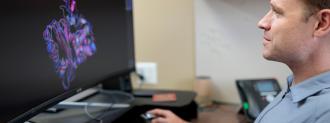Want to know how you can help fight coronavirus without leaving your home?
For two decades, the group Folding@home has been offering free downloads of software that puts the excess computing power from a device’s central processing unit (CPU) or graphics processing unit (GPU) to use running computationally intensive simulations for biomedical researchers.
Folding@home is now asking people to help it run simulations that could help bring the coronavirus pandemic to an end — and Freethink has answered the call.
Computer simulations help reveal a protein’s many potential forms, but they require a significant amount of processing power.
“It’s a project that’s right in the pocket for me personally: harnessing a little technical know-how, appreciating powerful CPUs and GPUs, advancing science, and directly finding a way to fight coronavirus,” says Freethink’s Director of IT Seth Goldin.
Fight Coronavirus From Home
Like all other living things, the coronavirus that causes COVID-19 contains proteins, a type of molecule formed from chains of chemicals called amino acids.
Proteins play a role in nearly every process that takes place within a cell, and just what that role will be depends on the protein’s shape after it undergoes a spontaneous “folding” process.
A single protein can fold into a variety of shapes, and knowing all of a protein’s potential forms can be incredibly useful for scientists.
If scientists know all the shapes the coronavirus’s proteins can take, for example, they might be able to identify shapes with “druggable sites” — places where drug therapies could bind to the protein to prevent the coronavirus from infecting a person.
Computer simulations can reveal a protein’s potential forms, but they require a significant amount of processing power to run.
To address this issue, Stanford University researcher Vijay Pande launched Folding@home in 2000, giving charitable citizens the ability to donate spare processing power from their personal computers, gaming systems, or, in some cases, even their smartphones to scientific research.
With Our (Processing) Powers Combined…
Past Folding@home projects have focused on proteins related to everything from Alzheimer’s disease to breast cancer.
Their work has led to the publication of more than 200 scientific papers — their simulations of an “undruggable” Ebola virus protein even resulted in the identification of a structure with a drug-binding site for potential treatments.
In late February, the group turned its attention to the coronavirus responsible for COVID-19.
As a company that works with a lot of video footage, Freethink has several powerful systems at our disposal, so we decided to join the cause.
To that end, we’re now dedicating two CPUs (an Intel Xeon Gold 6136 (12-core) and an Intel Xeon Gold 6152 (22-core)) and three GPUs (a NVIDIA GeForce GTX 1080 Ti card and two NVIDIA GeForce RTX 2080 Ti cards) to running Folding@home simulations.
We aren’t the only ones stepping up to fight coronavirus alongside Folding@home, either. The group has recently received an overwhelming amount of support — literally. On March 16, it wrote on Twitter that it was scrambling to keep up with the demand for new assignments.
The group is now working with partners to scale up, so don’t let the currently shortage of assignments discourage you from downloading the Folding@home software and helping Freethink fight coronavirus one simulation at a time.






